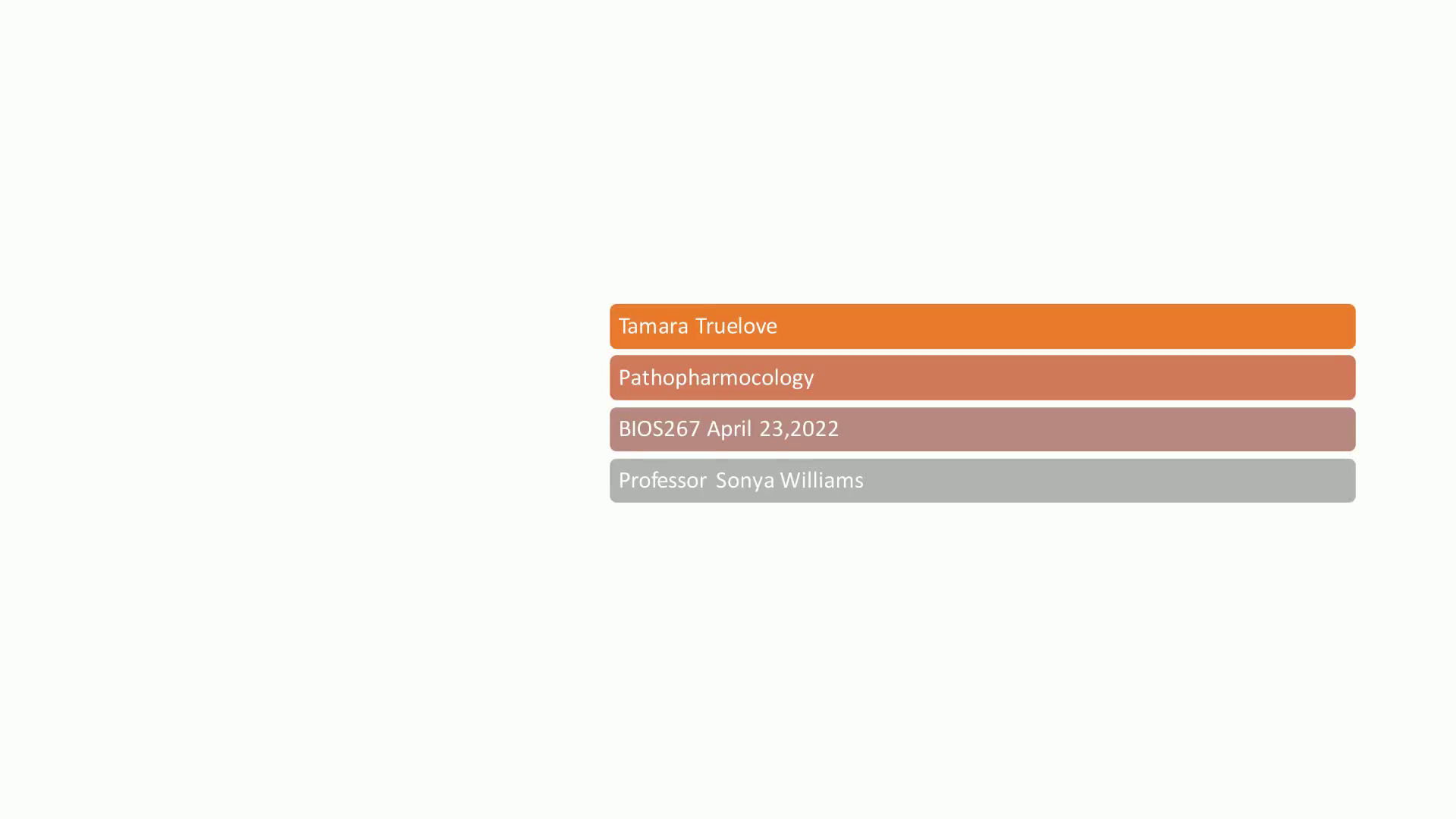Scene 1 (0s)
[Audio] Course Project Week 8 Tamara Truelove Pathopharmocology BIOS267 April 23,2022 Professor Sonya Williams.
Scene 2 (20s)
. . gastroenteritis. gastroenteritis.
Scene 3 (27s)
[Audio] Abnormal physiology of • Diseases of the gastrointestinal system can be one of many causes, affecting anywhere from the mouth to the anal canal. • Part of the problem in studies pertaining to diarrhea is the difficulty in identifying fecal " pathogens" among an enormous number of indigenous fecal microorganisms • Finally, the recognition of the pathogenicity of enterotoxins has created an awareness of the complexity of gastrointestinal physiology with host-parasite interactions..
Scene 4 (1m 1s)
[Audio] Affected Systems • Within the esophagus is a wide range of pathologies: scleroderma, esophageal dysmotility, esophageal strictures, esophagitis, achalasia, and esophageal varices; these diseases can affect the movement of food into the stomach. • Further along the gastrointestinal tract, gastritis involves inflammation of the stomach. • One such cause of autoimmune disease is pernicious anemia, a condition preventing the proper formation of intrinsic factor to vitamin B12, a nutrient vital in physiologic processes such as DNA/ RNA synthesis and hematopoiesis, and neurologic function. • Gastritis may have an acute onset caused by NSAIDs or mucosal ischemia..
Scene 5 (1m 55s)
[Audio] comparison to normal physiology • Normal bacterial flora populates the gut, increasing in numbers from the stomach to the distal colon • These bacteria are helpful to the human host by fermenting unused energy substrates; training the immune system; preventing growth of harmful, pathogenic bacteria; regulating the development of the gut; producing vitamins, like vitamin K2; and metabolizing estrogen and androgen hormones.
Scene 6 (2m 31s)
[Audio] • Bacterial gastroenteritis can result from invasion of the gut mucosal surface, attachment to mucosal surfaces and release of toxins, or by toxin production in food prior to ingestion. • Noninfectious gastroenteritis may also occur after ingestion of certain types of food and medicines but is less common. • Infectious gastroenteritis can occur year-round, but bacterial cases are seen more commonly in warm or summer months because bacterial pathogens can replicate in vitro after contamination of food or water..
Scene 7 (3m 7s)
[Audio] Background & History ⦁ acute gastroenteritis remains a major cause of morbidity and mortality ⦁ Cholera morbus is a historical term that was used to refer to gastroenteritis rather than specifically ⦁ cholera. ⦁ The first usage of "gastroenteritis" was in 1825.
Scene 8 (3m 29s)
[Audio] Causes • The causes include: • Viral or bacterial infection of the gastrointestinal tract • Direct contact with the virus from an infected person • Contaminated food and water • Unwashed hands after using the bathroom or changing a baby's diaper • Undercooked poultry, eggs, or poultry juices • Contaminated water in swimming pools • Other causes of gastroenteritis include • Heavy metals such as arsenic, cadmium, lead, or mercury in drinking water • Consuming too much of acidic foods such as citrus fruit and tomatoes • Toxins in certain seafood • Certain medications such as antibiotics, antacids, and chemotherapy.
Scene 9 (4m 24s)
[Audio] Symptoms ⦁ Watery diarrhea ⦁ Nausea and vomiting ⦁ Stomach pain and cramps ⦁ Low grade fever ⦁ Headache ⦁ Dehydration.
Scene 10 (4m 41s)
[Audio] Prevention • Always wash your hands, especially before eating or while preparing food • Eat fully and properly cooked food • Consume clean water and fluids in small amounts • Do not drink too much fluid at once • Vaccination available against certain types of bacteria and virus needs to be taken • Food handlers who are infected or recovering should not return to work until suggested by the doctor • Do not share your personal items such as tooth brush, spoons, or towels • Take plenty of rest • Do not swim if you have diarrhea or vomiting • Do not swallow the swimming pool water when you swim.
Scene 11 (5m 31s)
[Audio] Prognosis ⦁ Adults older than 65 years accounted for 83% of deaths and the majority of hospitalizations. ⦁ Gastritis only directly affects the stomach and may include nausea or vomiting, while gastroenteritis affects both the stomach and the intestines ⦁ Gastroenterology is an exciting and burgeoning field that provides an extraordinary number of career opportunities for physicians and scientists..
Scene 12 (6m 1s)
[Audio] Treatments associated with Gastroenteritis • There's often no specific medical treatment for viral gastroenteritis. • Treatment first involves self-care measures, such as staying hydrated. • Anti-diarrheal agents: To reduce diarrhea. • Loperamide • Vaccination: Vaccinations is recommended for infants. • Rotavirus vaccine • therapy: To replace the lost fluids and electrolytes and prevent dehydration..
Scene 13 (6m 40s)
[Audio] new technologies • The global Gastroenteritis Testing Market size is expected to Expand at Significant CAGR of +6% during forecast period ( 2020- 2026) • Rising number of initiatives for cancer radiotherapy is the vital factor escalating the market growth • Rising awareness about new enteric disease testing technologies • rise in prevalence of numerous infectious diseases among elderly people and rising adoption of enteric disease diagnostic products in hospitals and diagnostic laboratories are the major factors among others driving the gastroenteritis testing market..
Scene 14 (7m 23s)
[Audio] References Pediatric Gastroenteritis: Background, Pathophysiology, Epidemiology (medscape.com) Emergent Treatment of Gastroenteritis: Background, Pathophysiology, Etiology ( medscape.com) Gastroenterology: A Field With Endless Career Opportunities for Physicians and Scientists - Gastroenterology ( gastrojournal.org).
